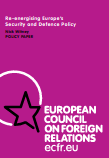№ 16 THE LIMITS OF ENLARGEMENT-LITE: EUROPEAN AND RUSSIAN POWER IN THE TROUBLED NEIGHBOURHOOD
№ 16 THE LIMITS OF ENLARGEMENT-LITE: EUROPEAN AND RUSSIAN POWER IN THE TROUBLED NEIGHBOURHOOD
Contributor(s): Ivan Yotov Krastev (Editor), Mark Leonard (Editor), Andrew Wilson (Editor)
Subject(s): Politics / Political Sciences, Politics, Governance, Government/Political systems, Politics and communication, Politics and society
Published by: ECFR European Council on Foreign Relations
Keywords: Russia; Putin Consensus; Russian Regime; authoritarian democracy; fake democracy; Russian political class; Medvedev Initiative;
Summary/Abstract: INTRODUCTION
What does Russia think? (by Ivan Krastev, Mark Leonard and Andrew Wilson, pp. 1-13)
THE “PUTIN CONSENSUS
”The “Putin consensus” Explained (by Vyacheslav Glazychev, pp.9-14)
The School of Consensus and the War of the Majority (by Modest Kolerov, pp. 15-20)
An Ideological Self-Portrait of the Russian Regime (by Leonid Polyakov, pp. 21-24)
DILEMMAS OF RUSSIA’S MODERNIZATION
Authoritarian Modernization of Russia in the 2000s (Olga Kryshtanovskaya, pp. 27-34)
A Bit of Luck: The Development of the Political System in Russia (by Aleksey Chesnakov, pp. 35-40
)Has the Economic Crisis Changed the World View of the Russian Political Class? (by Valery Fadeev, pp. 41-46)
Dilemmas of Russia’s Modernization (by Vladislav Inozemtsev, pp. 47-51)
RUSSIA AND THE WORLD: MEDVEDEV’S “EUROPEAN SECURITY TREATY” PROPOSAL
Rethinking Security in “Greater Europe” (by Fyodor Lukyanov, pp. 55-60)
Multipolarity, Anarchy and Security (by Timofey Bordachev, pp.61-66)
The Medvedev Initiative: The Origins and Development of a Political Project (by Boris Mezhuyev, pp. 67-71)
AFTERWORD
How the West Misunderstands Russia (by Gleb Pavlovsky, pp-73-78)
Series: ECFR Policy Briefs
- Print-ISBN-13: 978-1-906538-13-2
- Page Count: 69
- Publication Year: 2009
- Language: English
INTRODUCTION: What does Russia think?
INTRODUCTION: What does Russia think?
(INTRODUCTION: What does Russia think?)
- Author(s):Ivan Yotov Krastev, Mark Leonard, Andrew Wilson
- Language:English
- Subject(s):International relations/trade, Sociology of Politics
- Page Range:1-6
- No. of Pages:6
- Summary/Abstract:If we want to influence and deal with Russia, we need to understand it. But if we want to understand Russia, we should be interested in it. Unfortunately, we are not. The German political philosopher Carl Schmitt – who has become surprisingly popular in intellectual circles around the Kremlin – once noted that “victors feel no curiosity”. This is exactly what has happened to the European Union since the end of the Cold War. Gleb Pavlovsky, a political thinker with a novel-like biography, who is one of the Kremlin’s leading strategists, is right when he argues that the dominant discourse on Russia among Western liberals focuses on what Russia lacks – be it Western-style democracy, the rule of law or property rights. The tragedy of European foreign policy thinking is that we fell in love with our own paradigm. We are so convinced that what others want is to be like us that we are only really interested in whether, when and how they can be like us. For the moment, the Russian political elite does not dream of being like us nor does it want Russia to join the EU. But this does not mean that ideas mean nothing in Russian politics. On the contrary, after the de-ideologized 1990s, Russia is much more like it was in the 1980s, with a lot of intellectual energy unleashed by its quest for its own model.
THE “PUTIN CONSENSUS”
THE “PUTIN CONSENSUS”
(THE “PUTIN CONSENSUS”)
- Author(s):Vyacheslav Glazychev, Modest Kolerov, Leonid Polyakov
- Language:English
- Subject(s):Civil Society, Governance, Government/Political systems
- Page Range:8-24
- No. of Pages:15
- Summary/Abstract:The “Putin consensus” Explained (by Vyacheslav Glazychev, pp.9-14) The School of Consensus and the War of the Majority (by Modest Kolerov, pp. 15-20) An Ideological Self-Portrait of the Russian Regime (by Leonid Polyakov, pp. 21-24)
DILEMMAS OF RUSSIA’S MODERNIZATION
DILEMMAS OF RUSSIA’S MODERNIZATION
(DILEMMAS OF RUSSIA’S MODERNIZATION)
- Author(s):Olga Kryshtanovskaya, Aleksey Chesnakov, Valery Fadeev, Vladislav Inozemtsev
- Language:English
- Subject(s):Governance, Public Administration, Government/Political systems, Electoral systems
- Page Range:26-52
- No. of Pages:25
- Summary/Abstract:Authoritarian Modernization of Russia in the 2000s (Olga Kryshtanovskaya, pp. 27-34) A Bit of Luck: The Development of the Political System in Russia (by Aleksey Chesnakov, pp. 35-40) Has the Economic Crisis Changed the World View of the Russian Political Class? (by Valery Fadeev, pp. 41-46) Dilemmas of Russia’s Modernization (by Vladislav Inozemtsev, pp. 47-51)
RUSSIA AND THE WORLD: MEDVEDEV’S “EUROPEAN SECURITY TREATY” PROPOSAL
RUSSIA AND THE WORLD: MEDVEDEV’S “EUROPEAN SECURITY TREATY” PROPOSAL
(RUSSIA AND THE WORLD: MEDVEDEV’S “EUROPEAN SECURITY TREATY” PROPOSAL)
- Author(s):Fyodor Lukyanov, Timofei Bordachev, Boris Mezhuyev
- Language:English
- Subject(s):International relations/trade, Security and defense
- Page Range:54-71
- No. of Pages:17
- Summary/Abstract:Rethinking Security in “Greater Europe” (by Fyodor Lukyanov, pp. 55-60) Multipolarity, Anarchy and Security (by Timofey Bordachev, pp.61-66) The Medvedev Initiative: The Origins and Development of a Political Project (by Boris Mezhuyev, pp. 67-71)
Afterword: How the West Misunderstands Russia
Afterword: How the West Misunderstands Russia
(Afterword: How the West Misunderstands Russia)
- Author(s):Gleb Pavlovsky
- Language:English
- Subject(s):International relations/trade
- Page Range:73-78
- No. of Pages:6

